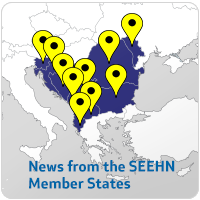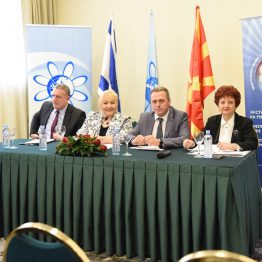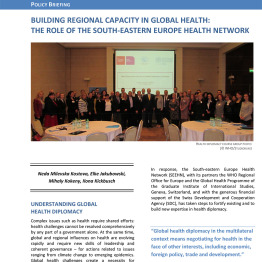
Participants:
- Mr Dragan Bogdanić, Minister of Health and Social Welfare of the Republic of Srpska
- Mr Victor Olsavsky, Head of the World Health Organization Country Office in BiH
- Mr Boris Rebec, World Health Organization Country Office in BiH
- The World Health Day is celebrated on April 7, on the day when in 1948, the World Health Organization was founded. This year’s World Health Day is dedicated to universal health coverage – Health for all. The marking of the World Health Day is a unique opportunity to point out the need for health care systems in the world to strive to provide the population with quality and accessible healthcare. These goals are also defined in the Global Sustainable Development Goals (SDG).
- The Government of the Republic of Srpska is continuously working on the improvement of the health system of the Republic of Srpska, with the patient being the focus of interest. This is supported by the fact that within the two phases of the “Health Sector Enhancement Project”, more than 47 million BAM has been invested in the primary healthcare over the past ten years, through construction, rehabilitation, reconstruction and equipping of family medicine outpatient clinics. More than 300 outpatient clinics have been built or reconstructed for the needs of family medicine teams within 120 facilities in 51 municipalities of the Republic of Srpska. Owing to the implementation of this Project, the availability of healthcare throughout the Republic of Srpska has considerably improved, which is particularly reflected in the strengthening of the capacity of branch outpatient clinics that are of great importance to the local population.
- Furthermore, significant projects at the secondary and tertiary healthcare level have been implemented. The respective projects include the construction and equipping of the Hospital in Bijeljina, Hospital in Nevesinje, reconstruction and equipping of the University Clinical Center of the Republic of Srpska, construction of the Hospital in Istocno Sarajevo (which is in progress). Moreover, the construction of a new hospital in Doboj is being planned.
- We would like to highlight that much has been done to improve the availability of all health services in the Republic of Srpska in recent years, including the MRI and CT examinations for which the patients needed to wait longer in the past 10 years than today. Waiting for these examinations has been reduced owing the introduction of centralized scheduling of examinations, introduction of the private sector into the health system, investment in equipment and personnel, and the like. In 2004, in the Republic of Srpska there was not a single MRI device and there were only three CT devices; however, today in the Republic of Srpska, there are 10 MRI devices and more than 15 CT devices available to the Fund-insured persons. In addition to the University Clinical Center of the Republic of Srpska, some magnetic resonance imaging in Banja Luka may also be performed in two private healthcare facilities, where patients wait for these examinations for two or three months. Patients wait shorter for MRI examination in hospitals in Doboj and Bijeljina, namely around 30 days. In emergency cases, patients do not wait for these examinations, namely, patients are hospitalized and the examination is performed in the hospital without the scheduling thereof through the Fund.
- More than 500 new diagnostic and treatment methods have been introduced in our healthcare institutions in the past ten years.
- Around million inhabitants of the Republic of Srpska have health insurance.
- Almost 50% of the total insured persons in the Republic of Srpska are on some basis exempt from paying copayment. Children up to 15 years, persons over 65 years, war veterans and families of fallen soldiers, and persons with impaired vision (first and second category) are exempt from copayment for all health services, whereas volunteer blood donors, beneficiaries of permanent financial assistance and persons accommodated in social welfare institutions and retirees with the lowest pension are exempt from copayment for most of health services. All insured persons are exempt from copayment for the measures of the prevention and early detection of disease. Furthermore, copayment is not paid for family planning services, childbirth and other services related to pregnancy and during the maternity period of up to 12 or 18 months after childbirth, under the respective diagnosis. Mothers do not pay copayment 12 months after childbirth, namely, 18 months for the birth of twins, the third child and each subsequent child. Moreover, copayment is not paid for examinations and treatments related to: in vitro fertilization, examination and treatment of oral and dental diseases of persons with inborn or acquired deformity of the face or jaw, examinations and treatment pertaining to communicable diseases for which the law prescribes the introduction of measures for preventing their spread, urgent medical conditions, including emergency medical examinations – life threats, examinations and treatment of occupational diseases and injuries at work, mobile orthodontic apparatus for children, total acrylate denture for insured persons over the age of 65, malignant diseases, diabetes, hemophilia, epilepsy, progressive musculoskeletal disorders, cerebral palsy, multiple sclerosis, improper bone and cartilage development (osteogenesis imperfecta – terminal stage), pleura (para, squared and tetra), chronic renal failure, cystic fibrosis, celiac disease and phenylketonuria, rheumatic fever, hereditary bullous epidermolysis, organ and tissue transplantation (paid neither by a donor nor a recipient), mental illness (psychosis), and intellectual disability.
- There are about 1,500 medications on the Republic of Srpska Health Insurance Fund List. A quarterly amount of medications may be prescribed to chronic patients. The number of prescription drugs has increased by 85 percent since 2006, while the number of doses and forms with which these drugs appear on the list has been increased by 257 percent. Medications may be taken in any pharmacy with which the Fund has a contract, and the contract is signed with over 200 private pharmacies.










